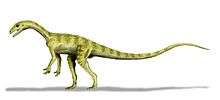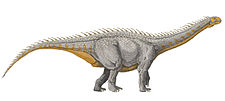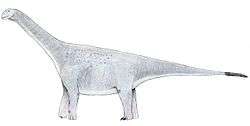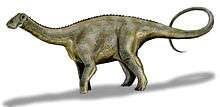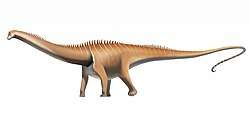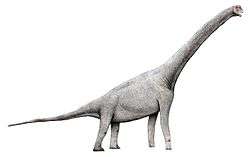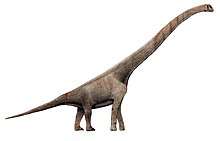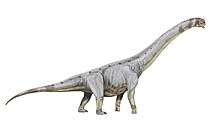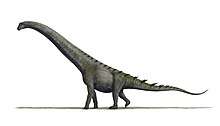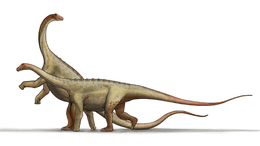Titanosaurus
Titanosaurus (meaning 'titanic lizard' – named after the mythological Titans, deities of Ancient Greece) is a dubious genus of sauropod dinosaurs, first described by Lydekker in 1877.[1] It is known from the Maastrichtian (Upper Cretaceous) Lameta Formation of India.
| Titanosaurus | |
|---|---|
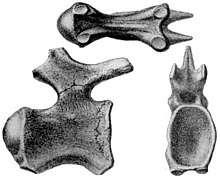 | |
| Titanosaurus indicus holotypic distal caudal vertebra | |
| Scientific classification | |
| Kingdom: | Animalia |
| Phylum: | Chordata |
| Clade: | Dinosauria |
| Clade: | Saurischia |
| Suborder: | †Sauropodomorpha |
| Clade: | †Sauropoda |
| Clade: | †Camarasauromorpha |
| Clade: | †Titanosauriformes |
| Clade: | †Somphospondyli |
| Clade: | †Titanosauria |
| Genus: | †Titanosaurus Lydekker, 1877 |
| Type species | |
| †Titanosaurus indicus Lydekker, 1877 | |
| Other species | |
| |
Discovery and naming
Titanosaurus was the first Indian dinosaur to be discovered. The holotype vertebrae was discovered in 1828, but it was not officially named until 1877.[2]
Taxonomy
Titanosaurus is estimated to have grown up to 9–12 metres (30–40 ft) long and up to approximately 13 tons in weight. Wilson and Upchurch (2003) treated Titanosaurus as a nomen dubium ("dubious name") because they noted that the original Titanosaurus specimens cannot be distinguished from those of related animals.[3]
Species
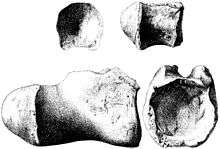
As the type genus of Titanosauria, Titanosaurus at times became a wastebasket taxon for a number of titanosaurs, including those not just from India but also southern Europe, Laos, and South America. Only two among these, however, are currently considered species of Titanosaurus: T. indicus and T. blandfordi, both of which are considered nomina dubia.
Other species formerly referred to this genus include:
- "Titanosaurus" rahioliensis - Described based on teeth, this species is now considered an indeterminate neosauropod.[3]
- "Titanosaurus" colberti - This species was the most well-known species of Titanosaurus, but has been moved into its own genus, Isisaurus.[3][4]
- "Titanosaurus" australis - Known from relatively complete remains, but has been renamed Neuquensaurus.[3]
- "Titanosaurus" nanus - A small species found to be non diagnostic, and hence a nomen dubium.[3]
- "Titanosaurus" robustus - Now referred to Neuquensaurus.[3]
- "Titanosaurus" madagascariensis - nomen dubium; UCB 92305 apparently related to Vahiny, while UCM 92829 has been reassigned to Rapetosaurus.[3]
- "Titanosaurus" falloti - This large species, native to Laos, has disputed affinities. It has been considered synonymous with Tangvayosaurus and Huabeisaurus, but the remains are too fragmentary to be sure.[3][5][6]
- "Titanosaurus" valdensis - Referred to a new genus, Iuticosaurus, but still considered a nomen dubium.[3]
- "Titanosaurus" lydekkeri - Also referred to Iuticosaurus, but its relation to I. valdensis is uncertain.[3]
- "Titanosaurus" dacus - A dwarf titanosaur; now moved to the genus Magyarosaurus.[3]
References
- Lydekker, R. (1877). "Notices of new and other Vertebrata from Indian Tertiary and Secondary rocks." Records of the Geological Survey of India, 10(1): 30-43.
- "Pranay Lal: India has not marketed or preserved its discoveries on dinosaurs".
- Wilson, J.A. and Upchurch, P. (2003). "A revision of Titanosaurus Lydekker (Dinosauria – Sauropoda), the first dinosaur genus with a “Gondwanan” distribution." Journal of Systematic Palaeontology, 1(3): 125-160.
- Jain, Sohan L.; Bandyopadhyay, Saswati (1997). "New Titanosaurid (Dinosauria: Sauropoda) from the Late Cretaceous of Central India". Journal of Vertebrate Paleontology. 17 (1): 114–136. doi:10.1080/02724634.1997.10010958. Retrieved December 31, 2012.
- Pang, Qiqing; Cheng, Zhengwu (2000). "A New Family of Sauropod Dinosaur from the Upper Cretaceous of Tianzhen, Shanxi Province, China". Acta Geologica Sinica. 74 (2): 117–125. doi:10.1111/j.1755-6724.2000.tb00438.x.
- Allain, R.; Taquet, P.; Battail, B; Dejax, J.; Richir, P.; Véran, M.; Limon-Duparcmeur, F.; Vacant, R.; Mateus, O.; Sayarath, P.; Khenthavong, B.; Phouyavong, S. (1999). "Un nouveau genre de dinosaure sauropode de la formation des Grès supérieurs (Aptien-Albien) du Laos". Comptes Rendus de l'Académie des Sciences, Série IIA (in French). 329 (8): 609–616. Bibcode:1999CRASE.329..609A. doi:10.1016/S1251-8050(00)87218-3.
